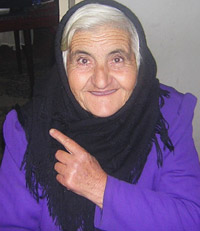Grandma Rosa has worked at a gas station for 24 years and does not complain about her life.
“I have raised my children well; I have even helped out relatives and friends. I have tried to help everyone. The soldiers used to say ‘fill up 10 liters of gas’ but I would fill 20. My neighbors would complain ‘Mrs. Rosa, what income will we have the next day?’, I used to tell them ‘God will help you; if we have something, we will take it home; if not, then nothing,” says Grandma Rosa. Grandma Rosa said the following as she reminisced about the hard days. “I was a landowner back then, but now…”
They used to live in the villa located in the center of Gyumri which also had a large land property. Later, a building was constructed there and they were given a four bedroom house. However, the earthquake in Gyumri also struck Mrs. Rosa’s home. Currently, we can say that there are some small homes in the “heart” of Gyumri, on one of the central streets. The once “landowner” woman lives in the small home to this day after the earthquake. Of course, you can still meet many families like hers in Gyumri which did not see the reconstruction of Gyumri and continue to live in the small homes.
“There are many people that received 2-3 homes; whoever can’t reason with them, will continue to live this way,” says Grandma Rosa. By “them” she means the Gyumri municipality. She did not forget to say one or two “nice” things about them.
Grandma Rosa watches television a lot. She prefers watching news programs and is well-informed about the country’s political situation. “I refused to participate in the elections because they do whatever they want. If the president of the country does whatever he wants, then the people will go along with saying “yes” or “no” just like they are told,” says Grandma Rosa as she explains why she is passive in politics.
Grandma Rosa is proud of her roots and sometimes even makes a fetish of the “resident of Gyumri” concept. One time in Yerevan they asked her: “Where are you from Grandma?” She said offended: “Any normal person is usually from Gyumri.” While talking about culture, Mrs. Rosa talked about Aghasi Shaboyan’s dance group and Frunzik Mkrtchyan’s acting and added: “Generally, anyone from Gyumri is an actor. Now, the comedians from Yerevan don’t know how to make people laugh.” When Mrs. Rosa meets someone, she always says that she is “the daughter of Ter-Davit, Pahlevan’s bride.” Mrs. Rosa’s eyes shine whenever she says the name of these two families. According to her, her father-in-law was proud that his bride was not a “kardiga” (mixture).
Obviously, Grandma Rosa remembers the old traditions of Gyumri. “Before the man (husband-K.T.) would come inside, the woman would get scared. Now the man has become the wife’s wife and does whatever she wants. Everything used to be normal. The bride would not go to sleep until she cleaned her father-in-law’s feet. Now, the brides don’t even pay attention to their father-in-laws,” says Mrs. Rosa. However, she doesn’t accept some customs in Gyumri. “Why did the mother-in-law have to bathe the bride until she gets engaged? Thank God there was nothing like that when I got married,” says Grandma Rosa.
She lives happily with her four daughters, six grandchildren (including the only child of her son that died at an early age) and her four children from the grandchildren. “I love all my grandchildren,” says Mrs. Rosa. But she confesses that she feels something special for one of them.
Mrs. Rosa wishes our country peace and a prosperous future so that we get over all the terrors, sadness and worries. Of course, she doesn’t forget to mention that “whatever happens, will happen to Gyumri.”

